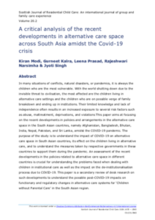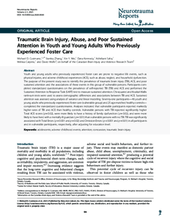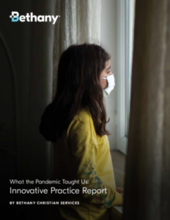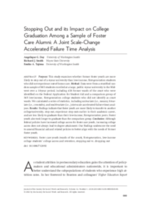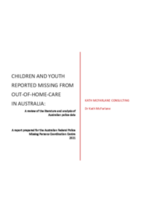Displaying 221 - 230 of 2221
This paper presents the findings from an in-depth study exploring the educational experiences and self-determined educational successes of young people who spent time in foster care in New Zealand.
Through the lens of primary (ability‐driven explanations) and secondary (choice‐based explanations, conditional on educational performance) effects on social background differentials in educational attainment, longitudinal data from more than 14 000 Swedes (of which around 9% have been placed in out‐of‐home care (OHC)) were used to estimate the relative importance of these two basic explanatory processes.
This brief resource from Who Cares? Scotland explores barriers to graduation for care-experienced young people, including moving placement, lack of space or equipment to study, challenges with mental health, finances, and housing, to name a few.
The purpose of the study is to understand the impact of COVID-19 on alternative care space in South Asian countries, its effect on the children living in alternative care, and to understand the measures taken by respective governments in these countries to support them during the pandemic.
The purpose of the present study was to identify the prevalence of traumatic brain injury (TBI), adverse childhood experiences (ACE), and poor sustained attention and the associations of these events in youth and young adults who previously experienced foster care.
This report summarizes findings from a mixed-methods case study of innovations and challenges within four Bethany foster care locations in the U.S.: Atlanta, Georgia; Philadelphia, Pennsylvania; Detroit, Michigan; and Grand Rapids, Michigan.
This study examines whether former foster youth are more likely to stop out of a 4-year university than low-income, first-generation students who did not experience out-of-home care.
This article explores the policy context and outcomes of the November 2020 announcement by the State (Labour Party) Government of Victoria in Australia that it would extend out-of-home care (OOHC) on a universal basis until 21 years of age starting 1 January 2021.
This report, prepared for the Australian Federal Police National Missing Persons Coordination Centre, sets out a national picture of children and young people reported missing in Australia.
This study sought to validate the Early TRAuma-related Disorders Questionnaire (ETRADQ), a caregiver report which was developed to assess attachment disorders in school-age children based on the Diagnostic and Statistical Manual of Mental Disorders–Fifth edition criteria.


